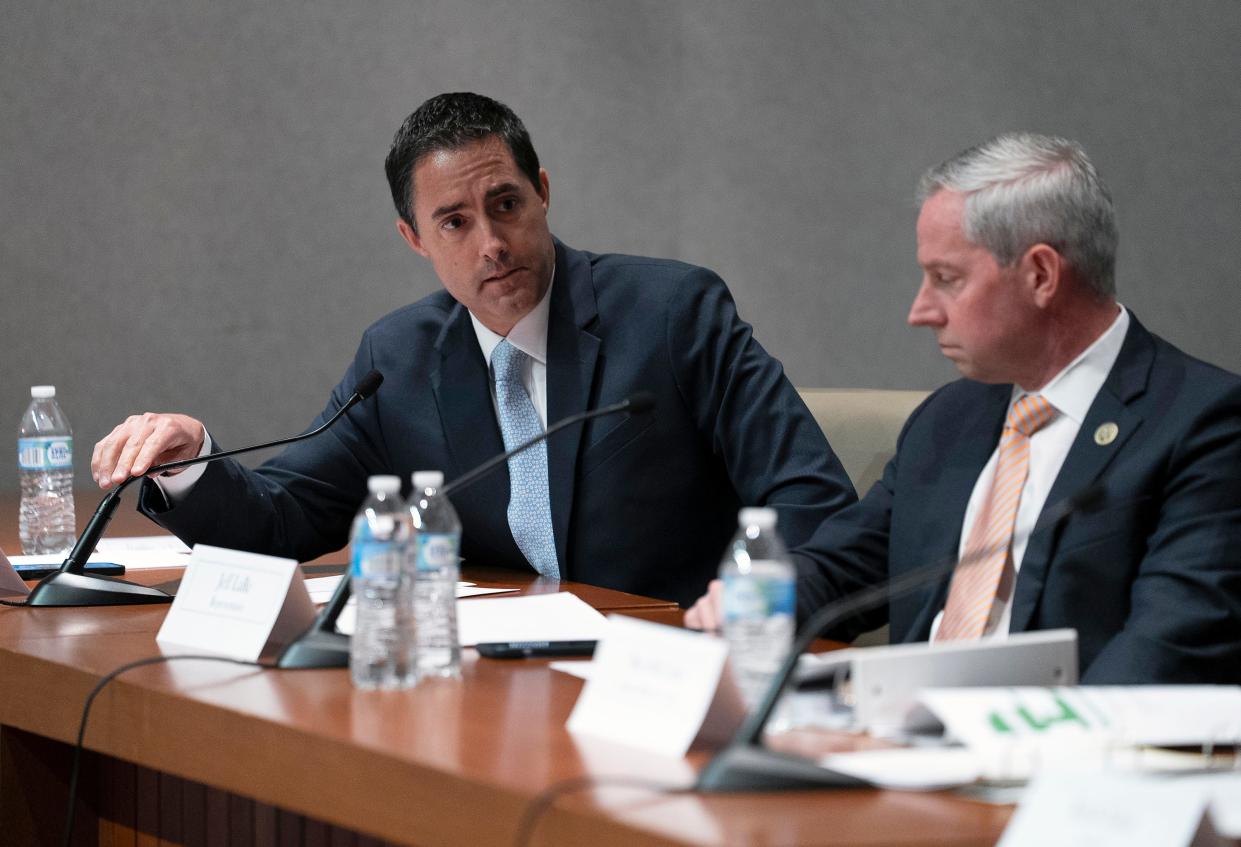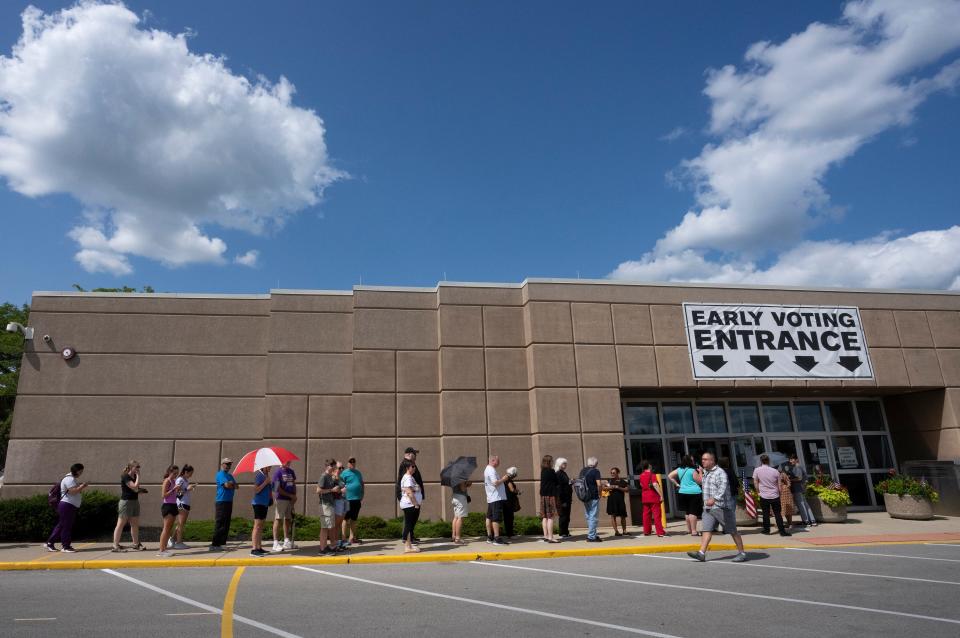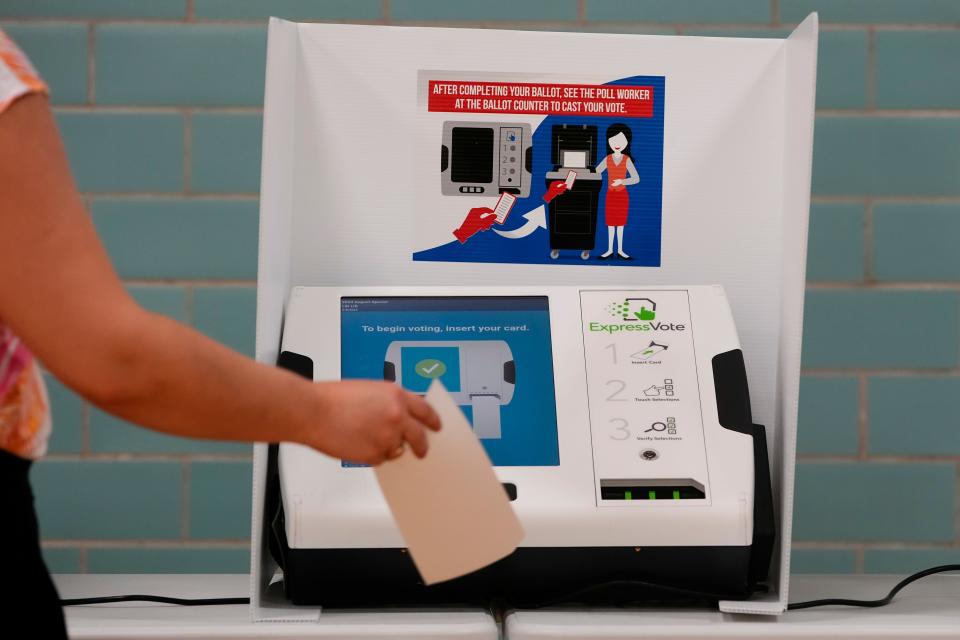As Frank LaRose eyes U.S. Senate, turnover plagues Ohio secretary of state's office

- Oops!Something went wrong.Please try again later.
High turnover and low morale have rocked the Ohio secretary of state’s office under Republican Frank LaRose, who has struck an increasingly partisan tone as the state’s election chief amid his bid to unseat Democratic Sen. Sherrod Brown next year.
In recent months, a dozen officials in LaRose’s office who handled elections, communications and other duties have left, taking with them years of experience in running Ohio’s elections. But the staffing problems extend even further, leading to delays and communication problems with local boards of elections.
“How many more dedicated and talented staff members will it take walking out the door before management takes a serious look at the source of the problem and finally creates a solution?” wrote former deputy elections administrator Luke Scott in an exit interview.
LaRose: Radical teachers unions wrong. Kids should not be forced to attend failing schools
Letters: Frank LaRose's hissy fit shows pain of embarrassing loss still stings
Scott, a Republican who previously voted in Democratic primaries, left the secretary of state’s office in February to work as deputy director of the Auglaize County Board of Elections. He declined to be interviewed for this story.
Three other former employees say the source of these problems is management laser-focused on electing LaRose as Ohio's next U.S. senator and unwilling to listen to seasoned election experts. The USA TODAY Network Ohio Bureau is not naming the ex-staffers because they fear retaliation.
“No mistakes, right? Because he wants to have a perfect track record when he runs for Senate,” one former employee said. “It’s very, we’re just going to make sure everything is perfect, but when you don’t have the resources or the manpower, that pressure and the relationship is not amiable.”
Elizabeth Walters: LaRose is flipping the finger at Ohioans. He's intentionally misleading you on abortion
Melanie Amato, a spokeswoman for LaRose's office, said turnover is common in government offices − particularly in the wake of the pandemic − and suggested the allegations by former employees are politically motivated.
"The timing of these claims is not a coincidence," she said. "Secretary LaRose ran an entire statewide reelection campaign last year, winning with more votes than anyone in the history of the office, and not once did anyone make these ridiculous assertions. Only in the last few weeks since he made a certain political announcement did this absurd narrative emerge, so you can draw your own conclusions about the timing and motivations."
The impact of understaffing
Nationwide, election officials are contending with turnover as partisan divides deepen and faith in the voting process wanes, driven by conspiracy theories and former President Donald Trump’s insistence that he won the 2020 presidential race.
But the challenges in Ohio go beyond that. In the past year, local boards have run two additional statewide elections, which cost taxpayers millions of dollars.
Ohio held a $13.8 million second primary in August 2022 after a lengthy battle between the Ohio Redistricting Commission, which LaRose is a member of, and the Ohio Supreme Court over whether the state House and Senate maps met voter-approved changes to curb gerrymandering.
This year, Ohioans turned out for an August special election and rejected an attempt to make it harder to amend the state constitution. Amato said the secretary of state's office is still calculating the final cost of that election, but lawmakers allocated $16 million for it in the budget.
LaRose championed the ballot measure, dubbed Issue 1, as local election officials quietly balked at holding an August election less than one year after the Legislature limited most of them.
“It was always push, push, push,” a second former employee said. “A lot of pressure for them, and heaven forbid if you do something wrong.”

Each time, LaRose publicly touted election officials’ ability to rise to the task. But former employees say they didn’t feel that support in the office. Scott, in his exit interview, described being belittled and silenced in some meetings and excluded entirely in others.
Former employees also attributed the high turnover to a leadership team that micromanaged elections staff and berated them for mistakes. Several long-time staffers who served under past secretaries of state have departed during LaRose’s tenure, leaving newer employees with less experience to keep the state elections office afloat.
“For a couple months, I’d go home crying all the time, and I couldn’t stand it,” the second former employee said.
Amato said the office's leadership team and human resources department work to ensure employees have the support they need.
"Our bipartisan team knows public service comes with high expectations and accountability," she said. "We have employees here who’ve been doing this work for anywhere from a few days to a few decades. They view it as a calling, even when it’s stressful. We’re incredibly proud of them and all our elections officials who manage through the demands of what we do."
As state election officials left, they were often not replaced, leading to more work for the people who remained, former staff said. Without enough staff in the election division, employees from other parts of the office were pressed into service to help with election night reporting or checking petitions for the two November ballot initiatives on reproductive rights and legalizing marijuana.
The staffing challenges also created more opportunities for mistakes.
In June, the secretary of state’s office sent the wrong ballot language to county boards of elections for August's Issue 1. Amato declined to say how much it cost to reprint the ballots. Chris Burnett, director of elections, attributed the mistake to a “transcription error in the sample ballot” in a letter to county officials.
But the first former employee said it could have been avoided if the office had been properly staffed.
“We were always just putting out fires,” the employee said. “You’d get one fire put out and you’d look behind you and there were three more fires.”
How employees reacted to ERIC exit
For some ex-staffers, the frustration hit a boiling point earlier this year when LaRose pulled Ohio out of a bipartisan elections group that aims to prevent double voting in multiple states.
As a member of the Electronic Registration Information Center, or ERIC, Ohio would submit voter data and driver’s license information to help identify people who died, moved or had duplicate registrations. ERIC also requires member states to send information to residents who aren’t registered to vote.
In recent months, however, ERIC has become a target of conservatives and election skeptics, prompting several GOP-led states to leave the organization. Ohio followed suit after LaRose said he tried and failed to urge the group to make changes. He also went after David Becker, a former board member who runs the Center for Election Innovation and Research and often speaks out against false voter fraud claims.
Two ex-staffers said the elections team was blindsided by LaRose’s decision. Amato declined to answer questions about how staff were notified and who knew about the withdrawal in advance. Now, Ohio is partnering with three other Republican-led states to exchange voter data.
“It all revolves around one person that they don't like, because they all view David Becker as being a political hack,” a third former employee said. “It was really an anti-David Becker movement more than it was anti-ERIC. But if you would have taken that out of it, or taken the politics out of it, ERIC is incredibly helpful and useful for election administration. And we had a lot of talks about why the a la carte approach doesn't really work.”

LaRose's Senate bid took center stage, former staffers say
To some former employees, the decision to leave ERIC was a symptom of a larger problem: The secretary of state’s office was becoming increasingly political.
LaRose is running in the 2024 Republican Senate primary against Cleveland businessman Bernie Moreno and state Sen. Matt Dolan, R-Chagrin Falls. The people who used to work for him said that race increasingly became the office's sole focus.
One ex-staffer said LaRose specifically ramped up security initiatives when he realized they could get the office good publicity. In August, for example, LaRose issued a directive aiming to boost cybersecurity and ensure physical equipment is protected.
“It has been the forefront of everything, whether it was how the office is going to be organized, how the next year and a half are going to go,” the third former employee said. “Everything revolved around the Senate run.”
The politics of the Senate race also spurred the ouster of LaRose’s former spokesman, Rob Nichols, who worked with Ohio Republicans in Columbus for years. LaRose fired Nichols after his disparaging social media posts about former President Donald Trump surfaced on X, formerly known as Twitter.
Trump has not yet endorsed a candidate in the Senate race, but LaRose hopes to secure the nod that helped propel U.S. Sen. J.D. Vance to office last year.
"That’s one of the most seasoned people that you’ve got, who understands better than most how to deal with the Ohio media,” said a Republican operative familiar with the situation who requested anonymity to speak candidly. “You don’t just ax your team when the going gets tough. Republican voters really want to see you fight for your people, and they have misread that completely."
Nichols declined to be interviewed.
Ethics rules govern how politicians can do their current job while running for the next one. Staff can't work for campaigns on state taxpayers' dime, for example, and there's no evidence that occurred in LaRose's office. But the line is less clear with incumbents using their current job as a resume point for their next one, said Daniel Birdsong, a University of Dayton political science senior lecturer.
"With an incumbent, the line has always been fuzzy from their official capacity and their running for election," Birdsong said.

'We feel like we're drowning'
Meanwhile, the turmoil in LaRose’s office has trickled down to some of Ohio’s 88 county boards of elections.
In Scott’s exit interview, he recommended to improve the relationship with local boards: “Stop targeting boards of elections and making them feel incompetent.”
High turnover at the secretary of state’s office has led to confusion and delays for local election officials, Auglaize County Board of Elections Director Michelle Wilcox said. Without that institutional knowledge at the state level, they have crowdsourced answers across local boards.
“It’s to keep our heads above water,” said Wilcox, who is a Democrat. “We feel like we’re drowning.”
Defiance County Board of Elections Director Tonya Wichman said state election officials used to take about a week to review and approve local ballot issues, but now it can take five to six weeks.
Wichman, a Republican, said these delays are understandable with many new staff members: “You don’t learn an election job in a day.”
Hamilton County Board of Elections Director Sherry Poland said the state’s staff turnover is indicative of the pressure all election officials have faced nationwide in recent years, but it hasn't impacted how Hamilton County runs elections. Poland, a Republican who also serves as president of the Ohio Association of Election Officials, said election officials’ work has been “extremely stressful” since 2020.
Still, former employees believe LaRose and his upper management have not done enough to allay the concerns of election officials – both locally and in the secretary of state’s office.
The result, the third employee said, is a revolving door: “There’s a definite lack of humanity, and there’s a hubris to that place that’s insufferable."
Jessie Balmert and Haley BeMiller are reporters for the USA TODAY Network Ohio Bureau, which serves the Columbus Dispatch, Cincinnati Enquirer, Akron Beacon Journal and 18 other affiliated news organizations across Ohio.
This article originally appeared on The Columbus Dispatch: Frank LaRose sees staff turnover amid 2024 Ohio Senate bid

